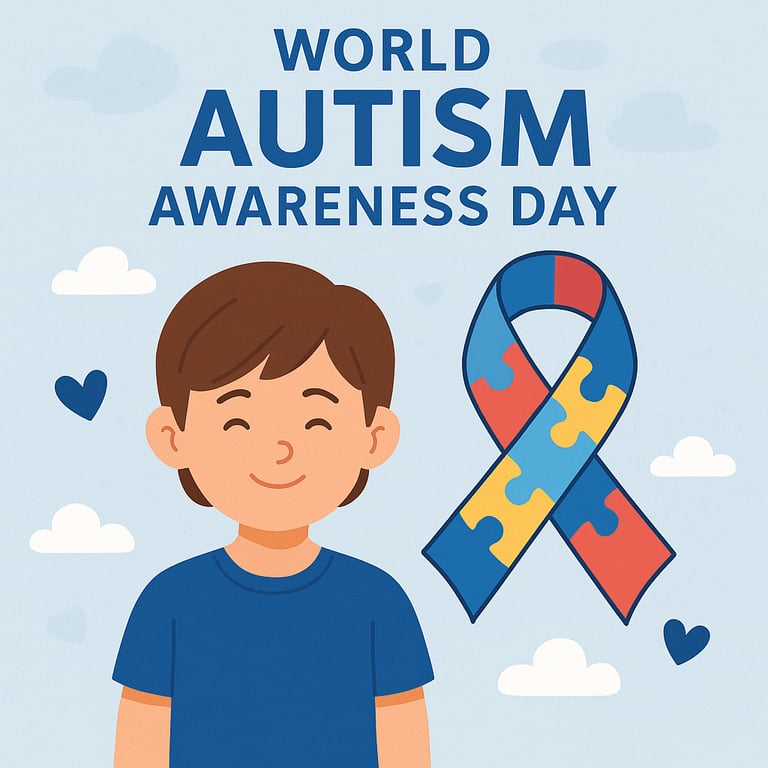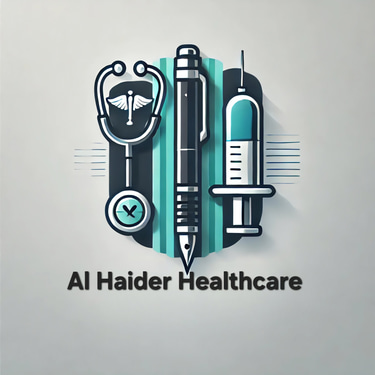

World Autism Awareness Day: Understanding, Management, and Treatment
World Autism Awareness Day is observed on April 2nd every year to raise awareness about Autism Spectrum Disorder (ASD), a neurodevelopmental condition affecting millions of individuals worldwide. This day serves as a reminder to promote inclusion, understanding, and support for people with autism and their families. At Al Haider Healthcare, we believe in spreading awareness and providing the right guidance for early intervention and management.
Risk Factors for Autism
While the exact cause of autism is still being researched, several risk factors have been identified:
Genetic Factors – Family history of autism increases the risk.
Prenatal and Birth Factors – Complications during pregnancy or birth, such as preterm birth or low birth weight.
Environmental Influences – Exposure to toxins, air pollution, or infections during pregnancy.
Neurobiological Factors – Differences in brain structure and function have been observed in individuals with autism.
Parental Age – Older parental age at conception may slightly increase the risk.
According to the World Health Organization (WHO) and Centers for Disease Control and Prevention (CDC):
Autism affects approximately 1 in 100 children worldwide.
Boys are four times more likely to be diagnosed with autism than girls.
Early diagnosis and intervention significantly improve long-term outcomes.
How to Manage Autism?
Although autism has no known cure, early intervention and supportive therapies can greatly enhance an individual’s quality of life.
Behavioral and Educational Therapies:
Applied Behavior Analysis (ABA) – A structured approach to encourage positive behaviors and reduce problematic behaviors.
Speech and Language Therapy – Helps improve communication skills.
Occupational Therapy (OT) – Supports daily life activities and sensory integration.
Social Skills Training – Helps improve peer interactions and relationships.
Medical and Alternative Approaches:
Medications – While no specific medication treats autism, certain drugs may help manage symptoms like anxiety, hyperactivity, or sleep disturbances.
Nutritional and Dietary Interventions – Some parents report improvements with a balanced diet and eliminating certain food sensitivities.
Parental and Family Support – Providing resources and counseling to families ensures better management at home.
School and Workplace Support:
Special education programs tailored to the child's learning style.
Workplace accommodations for adults with autism to enhance productivity and inclusion.
How to Support and Advocate for Autism Awareness?
Educate Yourself and Others – Understanding autism helps reduce stigma and misconceptions.
Encourage Inclusivity – Support workplaces and schools in providing accommodations for autistic individuals.
Participate in Awareness Campaigns – Join World Autism Awareness Day initiatives.
Support Autism-Friendly Organizations – Volunteer or donate to organizations supporting autism research and care.
Conclusion
Autism is not a disease but a different way of experiencing the world. With proper management, therapy, and support, individuals with autism can lead fulfilling lives. On World Autism Awareness Day, let’s work together to create an inclusive society where neurodiversity is respected and embraced.
For more information and expert guidance, visit Al Haider Healthcare (ahchospital.in) or consult a healthcare professional.
References:
World Health Organization (WHO) – https://www.who.int
Centers for Disease Control and Prevention (CDC) – https://www.cdc.gov
Autism Speaks – https://www.autismspeaks.org
Ministry of Health and Family Welfare, India (MoHFW) – https://www.mohfw.gov.in
What is Autism?
Autism Spectrum Disorder (ASD) is a developmental disorder that affects communication, behavior, and social interactions. It is called a "spectrum disorder" because it presents in a wide range of symptoms and severity levels, from mild to severe.
Common Signs and Symptoms:
Difficulty in social communication and interaction
Repetitive behaviors or restricted interests
Sensory sensitivities (over- or under-reacting to sounds, textures, lights, or touch)
Delayed speech or language development
Difficulty understanding social cues or emotions
Preference for routines and resistance to change
Autism can be diagnosed as early as 18 months, but early signs may appear before the age of 2 years. Early intervention plays a crucial role in improving communication and social skills.
